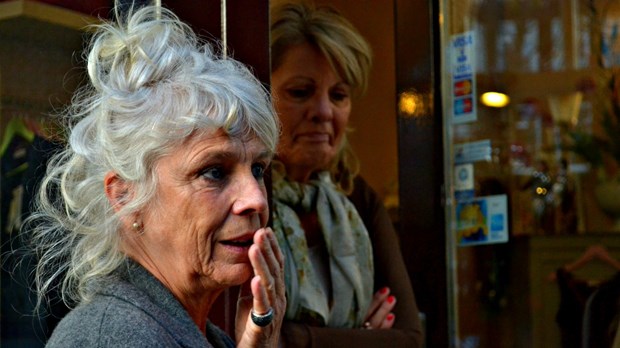Where Have All the Gray-Haired Ladies Gone?

I was 39 when my daughter started kindergarten. Elise’s enthusiasm for her new friends led me to volunteer as a chaperone for the pumpkin patch field trip. I chatted with other parents as the children scurried through the classroom putting toys away and grabbing jackets from wall hooks.
Then it happened. The question.
“It's so great you can help,” the young mom started. “Is Elise your granddaughter?”
A sledgehammer would have been a softer blow.
“No, she is my daughter.” I smiled but felt every gray-haired root dig deeper into my scalp.
The woman winced. I squirmed. It was grossly uncomfortable. I had failed the age-defiance goal of our culture.
The Choice
Years before when silver began to sparkle among my sable browns, I made a conscious choice: I would not color my hair. At the time, I served as a church youth director. My constant mantra to our teens was how precious and perfectly-made they were. In his own sovereign and all-knowing ways, God chose their body shape, freckles, eye color, and yes, hair color. As I considered my own graying hair, it felt hypocritical to laud the divine design in each teen while trying to negate God’s choice for me.
A few more years passed. I don't know when the grays began to outnumber the browns on my head, but I do recall when the message and mantra of God's creative design started to really feel personal. It was the day my daughter was born. I wanted my daughter to deeply grasp her own beauty and perfection in the eyes of God. Whether shopping from the girls' plus-size clothing racks or taming her fizzy curls, I felt it was critical for my daughter to be comfortable with her body. And instead of mimicking a single ideal, I wanted my daughter to embrace the uniqueness in every person she encountered. I began to realize how important it was for me to embody and exemplify the truth that my body, graying hair included, is fearfully and wonderfully made.
Why I’ve Gone Gray
I'm now 54 years old. I do not know if any sable browns remain on my head. But when I am with a group of women my age and older, I have noticed a puzzling trend: blonde, brunette, and ginger colors crown the heads of most of my peers. Typically, there are only one or two other silver-haired women present in a room. Where have all the gray-haired ladies gone?
Hair color frequently surfaces as a topic of conversation. Other women wistfully and sincerely compliment my graying tresses. Then, alas, they explain how the color “does not work” for them. They lament the time and expense of hair dye, but resign themselves to its continued place in their life.
There are many different reasons women conceal their gray hair and I can relate to the concerns women express. But I’ve decided to go gray anyway and here’s why:
Reason 1: That Awkward Transition
“I wish I could let my hair go gray but it is not changing evenly. I have a white skunk stripe running down the middle (or my temple or on the side).”
I understand! My own gray takeover was an uneven advance. My racing stripe was a reverse streak as the center section of my hair was the last to go platinum.
Transitions can definitely be awkward. Remember adolescence? The metamorphosis out of childhood was not a smooth process either. We endured changing hormones, a developing body, and the beginning of monthly menses. The struggle to become acquainted with our new self was real. Aging brings a second morphing life stage. Graying hair is but one part of the natural transitions into menopause. Hormones, metabolism, and body shape change. We must get acquainted with—and accept—our new selves once again.
Reason 2: My Job
“I'm in a professional job. It's fine for men to go gray. They look distinguished. But for women, we just look old.”
Superficial judgment about one’s competence based on appearance is but one of the many realities women face in the job market. But we will not be able to change the paradigm for ourselves or for the next generation of women if we continue perpetuating negative messages about aging. Aging is not a disease. Stepping into mature adulthood brings amazing workplace opportunities (such as mentoring) that I could only dream would have come my way as a 30something professional. When we release the goal of trying to look twenty years younger, we can more fully embrace the virtues of age.
Reason 3: My Family
“I do it for my children (husband). They (he) want me to look younger. I don't want to be mistaken for my children's grandmother.”
Been there, done that. Yes, the conversation that kindergarten morning still remains among the top nightmare moments in my life. But I didn’t die on the spot and the sun still rose the next day. My family’s love extends beyond my external appearance. Their affection does not decrease as my body ages. I admit I miss being my brunette self preserved in our old family photos. Yet I remain “mom” and would not trade a single decade of experiences to be that young age again.
Reason 4: My Self-Image
“I feel better about myself when my hair is not gray.”
The moving sidewalk of age advances despite our desire to stand still. Aging is tough, and the yearning to feel better about ourselves is very real. But when we face this struggle, our faith drives us toward a much bigger answer than physical appearance. Self-image finds its true voice in the profound love of our God. Jesus’ sacrificial journey to earth demonstrates our worth well beyond any marketing campaign that declares “you are worth it.” We are treasures in God’s eyes, not because of our external attributes, but because he created us and died for us.
Aging Is a Gift
Unfortunately, since we live in an environment that denigrates age, we often allow cultural expectations to replace these biblical truths. We start to consider it a badge of honor when someone guesses our age and shaves years off.
Our discomfort with age spills into a wide range of goods and services we spend our money and time on. We sense the mirror judging every glitter of gray and crease of skin. The new and improved formulas of the latest eye-wrinkle moisturizer find their way onto our bathroom shelves, whether we color our hair or not. Our resistance to aging fuels a massive industry of Botox injections, eye-lid surgeries, and breast augmentations. According to Transparency Market Research, we now spend close to $120 billion in age-defying products. The expenses exceed the GDP of most countries on the planet! We spend lavishly when we hear the promise of removing signs of aging. Calls from the fountain of youth shout loudly and frequently.
But the Bible paints a different picture of old age. Time and time again, Scripture calls long life a blessing. It is a promise God gives to kings and children alike (1 Kings 3:14; Exodus 20:12). A long journey on this planet allows us to serve as seasoned and tested witnesses for God. Our travels bring experience and wisdom. We have the responsibility to steward these experiences for kingdom growth. The gift of age is indeed a privilege. “Gray hair is a crown of glory; it is gained by living a godly life” (Proverbs 16:31). Yet the crown of silver is a treasure that we often expertly hide.
When I look at my hands I am beginning to see my grandmother’s hands. Thinning skin, visible veins, wrinkles. I reach for the hand lotion every time. I’m at peace with my gray hair but the wrinkles alarm me. The transition in my aging body persists. When discomfort with aging overwhelms me, I reach for Psalm 139. Whether in my mother’s womb or 54 years hence, I am fearfully and wonderfully made in the image of God.
I know everyone won’t make the same choice I have when it comes to hair, but we all can embrace the biblical call to honor age rather than denigrate it. Let’s make maturity our goal rather than chasing after the elusive promise of perpetual youth. The next time age arises in conversation, let’s replace the praise of “Wow, you look so much younger. I never would have guessed your age!” with “Wow, I’ll bet you’ve learned much during your journey. I'd love to hear your stories and lessons learned. Can we have coffee?”
Sharon R. Hoover is the Director of Missions at Centreville Presbyterian Church (Virginia). She also writes and speaks to encourage women in their faith journey. Connect with Sharon on Facebook, Twitter or at SharonRHoover.com.
Read more articles that highlight writing by Christian women at ChristianityToday.com/Women
 Read These Next
Read These Next
 Is it OK for Christians to have cosmetic surgery?No TV show regularly records what happens after the "reveal" on programs such as Extreme Makeover.
Is it OK for Christians to have cosmetic surgery?No TV show regularly records what happens after the "reveal" on programs such as Extreme Makeover.
 Pursuing God, Pursuing FitnessHow you can find the time and stay motivated to exercise
Pursuing God, Pursuing FitnessHow you can find the time and stay motivated to exercise








 Homepage
Homepage